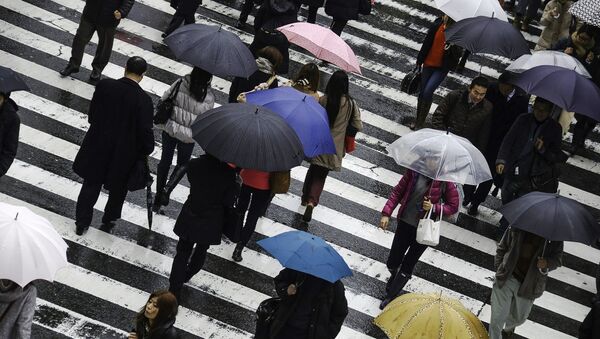The poll found that 25.6 percent of women had considered taking their own lives, while 21.4 percent of men admitted they had thought of suicide.
In terms of age, people in their 50s were discovered to be more disposed to suicidal thoughts than those in other age brackets, at 30.1 percent, followed by those in their 30s (28.7 percent), 40s (24.3 percent), 20s (23.0 percent), 60s (20.2 percent), and people aged 70 or older (19.1 percent).
A further 18.9 percent said they had thought of suicide in the past year.
A March study by the University of Pennsylvania's Wharton School found that Japan has the third-highest male suicide rate among nations in the Organization for Economic Co-operation and Development (OECD).
RT whartonknows: “Suicides at a young age have a major impact on the economy” in Japan and South Korea, Wharton re… https://t.co/VoSiLp5PLO
— David W Versailles ✈ (@DWV13) March 22, 2017
Researchers at Wharton discovered that men are more likely to commit suicide than women, while the survey from the Health Ministry found that women think of suicide more often than men.
The country's high suicide rates brought down the national life expectancy at birth of men by 435.7 days on average, compared to 247.7 days among women, the Wharton study says.
"Adverse economic conditions, unemployment, changing family structures, depression, inadequate access and resistance to mental health care, and substance abuse" were the main reasons for such a high suicide rates in both Japan and South Korea, according to the report.
"Clearly, this is a major public health epidemic, which has a high impact on quality of life."
There have been a number of government initiatives to lower suicide rates in Japan such as the launch of a "counter suicide White Paper" in 2007 which by 2017 hopes to cut suicide by 20 percent.
DEPRESSION and SUICIDE Countermeasures, in Japan: http://t.co/0Hp5BA0o4A
— leo uzych (@LeoUzych) October 3, 2013
Although it is unlikely that target will be met there has been a gradual decrease in suicides since 2009. A World Health Organization report says there were around 25,000 suicides in Japan while in 2016 the number dropped to 21,764, according to figures from the National Police Agency.
The health ministry survey found that just 6.9 percent of respondents were aware of the nationwide suicide prevention phone service, while 5 percent said they knew about weeklong and month-long national campaigns for suicide prevention.
The Health, Labor and Welfare Ministry said that they seek to raise public awareness of suicide prevention services with a string of new measures this summer.
"We would like to further promote notification of consultation services and development of mental health measures at workplaces," an official of the Health, Labor and Welfare Ministry said.
The survey was conducted last October on 3,000 people aged 20 or older.




